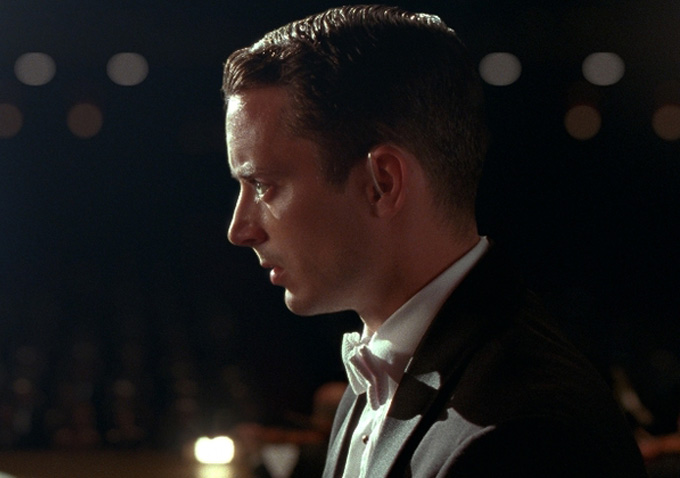
A welcome reminder that high-concept thrillers needn’t rely on stupid coincidences and even stupider characters in order to succeed, “Grand Piano” turns the unlikeliest of scenarios into a riveting battle of wills. The story of a concert pianist whose comeback performance gets hijacked by a sniper with a secret agenda, director Eugenio Mira’s latest film breathlessly combines artistic anxiety and personal desperation, providing its character with a journey as intense emotionally as it is physically. In fact, probably the best Brian De Palma movie he never made, “Grand Piano” expands the boundaries of single-location, real-time mysteries like “Phone Booth” and “Panic Room” with a brilliantly simple concept and nimble, elegant style.

Elijah Wood plays Tom Selznick, a master-class pianist set to play in public for the first time in five years. Having famously choked during a performance of a piece by his late mentor, he is understandably nervous about his return to the stage. But shortly after he begins playing, he discovers that someone has marked up his sheet music with threats to murder him and his wife Emma (Kerry Bishé) unless he performs flawlessly. Receiving an earpiece that allows his would-be puppetmaster (John Cusack) to communicate with him, he’s confronted with a challenge that has multiple repercussions—namely, in delivering a performance that not only saves his career, but his very life.
As loath as I am to describe the music in the film as “another character,” the concerto written by Victor Reyes is absolutely essential, providing a (no pun intended) meticulously orchestrated through line that frames and enhances each new development in the story even as it serves as a ubiquitous reminder of Selznick’s past failures. That it occasionally allows him to depart the stage mid-performance constitutes great planning on Mira’s part, but the fact that it provides a parallel line for Selznick’s emotional state as he embarks on this unexpected rollercoaster is truly masterful. There are few modern examples of music being truly integrated into storytelling, certainly as well as this film does, and even without an appreciation for classical composition, there’s much to admire about its use and effectiveness.

As the man behind the keys, Wood carries the film, finding a believable and compelling arc for a character whose default setting might in lesser hands be desperation. Selznick’s paralyzing fears of choking a second time are echoed repeatedly in dialogue in opening scenes, first during a particularly contentious phone interview commemorating the performance, then from virtually everyone he encounters—he’s not allowed to forget how grandly he flopped five years prior, even if he could manage to forgive himself. But through Wood, the character convincingly evolves over the course of the film, initially aiming for perfection out of fear, and then slowly building his confidence as he begins to devise a way to turn the tables on his unseen adversary.
Wood is an ideal casting choice for a role like this—handsome and obviously gifted, but overshadowed physically by the actress who plays his more-successful movie star wife—and he turns an otherwise self-contained journey into an opportunity for personal empowerment and professional redemption. Meanwhile, Cusack has less to do physically as the voice on the other end of Selznick’s earpiece, but he nevertheless communicates a palpable sense of danger that his victim is right to take seriously. Together, they create a psychological duel worthy of the film’s theatrical pitch, cementing its intensity as the final, crucial notes of Selznick’s performance rapidly approach.

Serving as more than a welcome contrast to the handheld, improvisational camerawork of too many other movies these days, Mira’s direction is a marvel of fluidity and poetry. The careful composition of each shot enhances the film’s melodramatic sweep without distracting from the story and performances; whether simply taking inspiration or outright stealing pages from (classic) De Palma’s playbook, Mira distinguishes his film with a classical, muscular visual style that suits its high-society backdrop, and mirrors Selznick’s mental scramble to focus on his performance and his potential murder at the same time.
Although he’s occasionally distracted by expository or plot-lengthening devices such as the sniper’s accomplice and Selznick’s wife’s obnoxiously self-involved friend, Mira makes a breakthrough here as a storyteller and visual stylist that should pay great dividends, regardless of whether or not he chooses to migrate from Spain to Hollywood. But regardless of his own future, Mira makes Selznick’s comeback a remarkably immediate experience by dropping the audience into the middle of his implausible, heightened concept and then enabling them to identify with the character’s anguish. Ultimately an expertly timed, painstakingly assembled and endlessly engaging game of cat and mouse, “Grand Piano” succeeds as a whole for the same reasons that Selznick does—namely, because Mira brings all of its elements to work together in concert, and then executes them like a virtuoso. [A-]
This is a reprint of our review from the 2013 Fantastic Film Festival.

